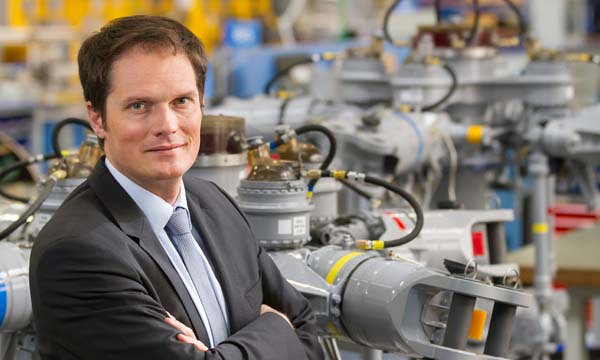Interview with Matthieu Louvot, Vice President Customer Support & Services at Airbus Helicopters |
| Interview by Léo Barnier |
|
|
14 DEC 2017 | 1331 words
|
 |
© Airbus Helicopters |
|
|
|
The contrast could not have been sharper between the MRO Europe and Helitech exhibitions that were held together in London last October: while the maintenance expo was a lively one, the helicopter show still seemed to be affected by the downturn that the sector has been experiencing for several years now. Ideally placed at the crossing point between these two worlds, Matthieu Louvot, Executive Vice President Customer Support & Services at Airbus Helicopters, takes a look at how this branch is structured at the European helicopter manufacturer, along with the consequences this downturn is having on its activities.
What does the customer support activity represent at Airbus Helicopters?
A helicopter flies on average for around forty years under difficult conditions. There's a huge amount of assistance to be provided. It is an important driver for us and our customers. Support activities account for around 50% of our turnover, with six thousand people dedicated to them. Three thousand are based in France and Germany and three thousand elsewhere around the world, particularly in the United States, Brazil and China. We have subsidiaries with service centres in around thirty countries.
We have five major service ranges at Airbus Helicopters: MRO and cell and equipment improvement, spare parts management, technical support with "tech reps", technician and pilot training and connected services with data analysis, automation and service optimisation.
What areas are you working on to improve your offer?
We launched a transformation plan in 2013 based around quality, competitiveness and customer satisfaction. The customer satisfaction aspect is based on improving services' operational performance. We have been able to reduce the number of parts delivered late by a factor of five. To achieve this, we have worked on our stock and set up an electronic system to optimise the delivery processes. We have integrated our thirty subsidiaries into it to provide us with visibility over the parts and their movement. Our tech reps go to see their customers at least once a year, which enables us to speed up our technical responses.
We restructured our HCare service offer two years ago, with simpler and more competitive contracts. We lowered our prices and improved the financial conditions for accessing this offer, with a reduction in entry price. For an Écureuil, this can give a price of around 150 Euro per flying hour. We have also reduced the minimum annual flying hours from 150 to 100.
The parts management offers have been simplified with HCare Smart, which provides PBH (Parts by-the-Hour, access to Airbus Helicopters parts stock), RBH (Repair by-the-Hour, stock on the customer's premises) and EBH (Exchange by-the-Hour, stock on the customer's premises and part exchange during scheduled maintenance) and FBH (Full by-the-Hour) services. We have also launched the HCare Infinite offer, with a contract based on availability rate.
Airbus has committed itself to a digital conversion strategy. What does this actually mean for you?
With connected services, we enable our customers to go from paper to digital. They can monitor the changing parameters for their fleet, with services such as Fleet Keeper digital registries, which have already been validated by the DGAC. The equipment files will also be digitised from the end of 2018. A test phase will be carried out first of all at the start of the year.
Airbus Helicopters is developing an analysis service from this data. We launched FlyScan in spring 2017 to develop predictive maintenance from data collected by HUMS (health and usage monitoring systems). This enables us to improve operational reliability and lower maintenance workload. It will be available on all machines equipped with HUMS, an option which is available on all Airbus Helicopters twin engine helicopters.
The operator retains ownership of this data and makes it available to us. Compiling this data enables us to detect weak signals. We can also find similar cases more easily with data exploration and improve our reaction times and our continuous improvement process.
Do you still need the people involved - operators, maintenance companies, etc. - to keep up with this digital evolution for the approach to work?
Our network of representatives in Europe and the United States is working with their local partners to help them improve and take advantage of all the improvements made possible by digital tools. We also want to develop them in China, Australia, Brazil and so on. We have strengthened our partnerships with the service centres we have approved.
How are MRO activities divided between you and specialist companies?
Airbus Helicopters carries out around one quarter of maintenance operations with its subsidiaries. The rest is done by approved operators and companies, in particular for line maintenance. Many operators still have their own workshops, with significant skills for first and second level maintenance.
For line maintenance, Airbus Helicopters is mostly positioned on emerging markets, which still need to be structured. We focus more on major inspections and improvement projects, even if there are operators who are able to do these.
The helicopter market was hit particularly hard by the slow-down in the oil industry and has been struggling for several years. How has this drop in activity affected support?
There are around 12 000 Airbus helicopters in service around the world. This number is rising, even if it has been rising more slowly over the last few years. The market was hit by the offshore crisis and companies have optimised their fleets. We estimate that the market will pick up again over the next few years, in particular with the H175s and H160s. Light machines are helping to make up for it a little. The H135s and H145s are continuing to be a major commercial success, with support contracts included.
The offshore crisis has had a less severe impact on the number of flying hours, which are continuing to rise steadily. This has still had a immediate effect on the HCare service offer and the flying hour contracts (PBH, EBH, RBH, FBH).
Do you have any specific initiatives in place to improve the situation?
We are keeping the same strategy and opening up new services. This year, we have introduced an online catalogue with all the improvements available from us and from our subsidiaries. By the end of the year it will have over 1 000 references, with supplemental type certificates (STC) and service bulletins (SB). It will also be possible to order online.
Our activity is very sensitive to the second-hand market. We check whether used helicopters can find new owners quickly. We have developed a trade-in offer for certain operators to make this market smoother.
Airbus Helicopters is also encouraging helicopter transport, with projects like Voom in São Paulo (Brazil). This is an on-demand helicopter service which has been operating via an Internet platform for the last six months. It increases demand. We will be encouraging the development of new platforms.
There are more changes in the military market, where we now offer our customers commitments to high levels of availability.
Indeed, there's a lot of talk about the low availability rate for helicopters in the French armed forces. How is the situation changing?
The availability situation is mostly improving for the French fleets (Army light aviation, Navy and Air Force). We are involved in the helicopter action plan in partnership with the DGA, the SIMMAD and the general staff. Airbus Helicopters has helped to improve the maintenance plans and increase the intervals between inspections. We have reduced component repair cycles by 20% on Tigres and NH90s. Work has also been carried out to simplify manufacturer document, particularly on the NH90. This is now being applied to operational documentation.
These plans are complicated to put in place, with a lot of people involved. We have to push all the buttons at the same time. But change has been positive over the last few months. We're not there yet, but we're well on the way.
|
|
 |
Léo Barnier
Specialized journalist
Industry & Technology, Equipments, MRO
|
|
| |
They made this section possible |
|
|
|
|
|
|
|
|
|
|
|
|
|
|
|
|
Top stories |
|
|
|
|
|
Top stories
|